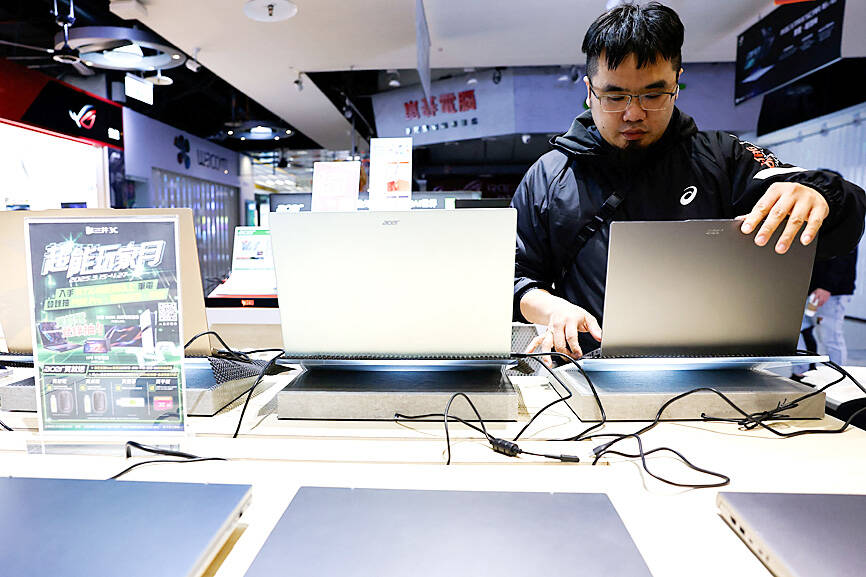Taiwanese exporters cannot claim that components in their products made with US technology should be exempt from US tariffs, the Office of Trade Negotiations said on Monday.
US President Donald Trump last week unveiled sweeping tariffs on countries that have large trade surpluses with the US, effective today.
The tariffs would be guided by the US federal government’s tariff document 9903.01.34, also known as the US content rule, which stipulates that products with at least 20 percent of their content made in the US can be exempt from tariffs on that content.

Photo: Ann Wang, Reuters
The US content rule has been described as a “humanitarian corridor,” as Taiwanese companies, including iPhone and MacBook manufacturers and artificial intelligence product makers, are studying the rules, hoping to secure relief from Trump’s tariffs.
One possibility is that components or assemblies using US technology could be tariff-exempt as “US content,” but the trade office said the content rule does not apply to technology.
For hardware, Taiwanese exporters need to provide documents to prove the US origin of the components when they declare their products at US customs, it said.
For example, even if 20 percent of a foreign product’s content was made in the US, the remaining 80 percent of the product value made abroad would still be subject to import duties, the office said.
That is, a Taiwan-made product valued at US$100 with US$20 worth of components made in the US would be taxed based on the remaining value of US$80, the office said.
Taiwan is not expected to benefit much from the US content rule, as only a small number of Taiwanese firms buy components from US suppliers and use them in products resold to the US market, the office said.
For the many Taiwanese artificial intelligence server makers that have moved production to Mexico over the past few years hoping to capitalize on the North American free market, these suppliers would still need to prove that the components they use were made in the US to get tariff exemptions, it said.
How US content is calculated would be up to US customs’ assessments, it said.
In related news, the American Chamber of Commerce (AmCham) in Taiwan called for exemption from the 32 percent US tariffs on Taiwanese goods.
The US’ action “could jeopardize the stability and trust underpinning the US-Taiwan relationship,” AmCham Taiwan said in a statement, calling on Washington and Taipei to accelerate talks on the issue.
AmCham Taiwan chairman Dan Silver expressed support for President William Lai’s (賴清德) reaffirmation of Taiwan’s commitment to the bilateral partnership with the US, including his call for reciprocal tariff reductions and greater market alignment.
“Taiwan has long acted in good faith to address trade imbalances and remains a reliable partner to the United States,” Silver said in the statement.

TARIFFS: The global ‘panic atmosphere remains strong,’ and foreign investors have continued to sell their holdings since the start of the year, the Ministry of Finance said The government yesterday authorized the activation of its NT$500 billion (US$15.15 billion) National Stabilization Fund (NSF) to prop up the local stock market after two days of sharp falls in reaction to US President Donald Trump’s new import tariffs. The Ministry of Finance said in a statement after the market close that the steering committee of the fund had been given the go-ahead to intervene in the market to bolster Taiwanese shares in a time of crisis. The fund has been authorized to use its assets “to carry out market stabilization tasks as appropriate to maintain the stability of Taiwan’s

STEEP DECLINE: Yesterday’s drop was the third-steepest in its history, the steepest being Monday’s drop in the wake of the tariff announcement on Wednesday last week Taiwanese stocks continued their heavy sell-off yesterday, as concerns over US tariffs and unwinding of leveraged bets weighed on the market. The benchmark TAIEX plunged 1,068.19 points, or 5.79 percent, to 17,391.76, notching the biggest drop among Asian peers as it hit a 15-month low. The decline came even after the government on late Tuesday authorized the NT$500 billion (US$15.2 billion) National Stabilization Fund (國安基金) to step in to buoy the market amid investors’ worries over tariffs imposed by US President Donald Trump. Yesterday’s decline was the third-steepest in its history, trailing only the declines of 2,065.87 points on Monday and

TARIFF CONCERNS: The chipmaker cited global uncertainty from US tariffs and a weakening economic outlook, but said its Singapore expansion remains on track Vanguard International Semiconductor Corp (世界先進), a foundry service provider specializing in producing power management and display driver chips, yesterday withdrew its full-year revenue projection of moderate growth for this year, as escalating US tariff tensions raised uncertainty and concern about a potential economic recession. The Hsinchu-based chipmaker in February said revenues this year would grow mildly from last year based on improving supply chain inventory levels and market demand. At the time, it also anticipated gradual quarter revenue growth. However, the US’ sweeping tariff policy has upended the industry’s supply chains and weakened economic prospects for the world economy, it said. “Now

Six years ago, LVMH’s billionaire CEO Bernard Arnault and US President Donald Trump cut the blue ribbon on a factory in rural Texas that would make designer handbags for Louis Vuitton, one of the world’s best-known luxury brands. However, since the high-profile opening, the factory has faced a host of problems limiting production, 11 former Louis Vuitton employees said. The site has consistently ranked among the worst-performing for Louis Vuitton globally, “significantly” underperforming other facilities, said three former Louis Vuitton workers and a senior industry source, who cited internal rankings shared with staff. The plant’s problems — which have not